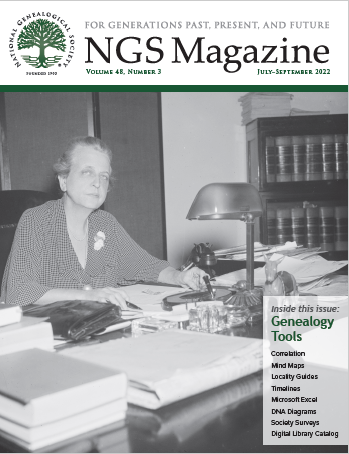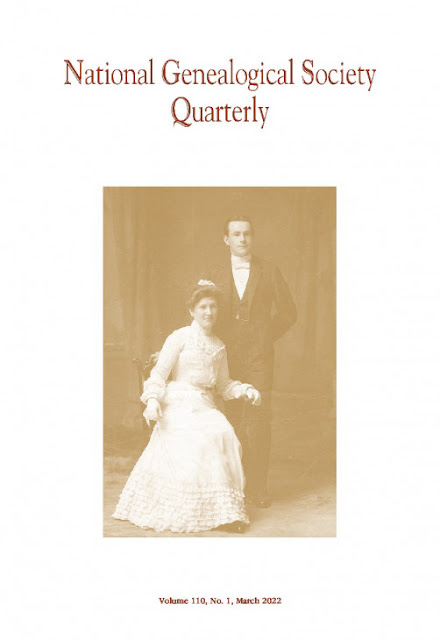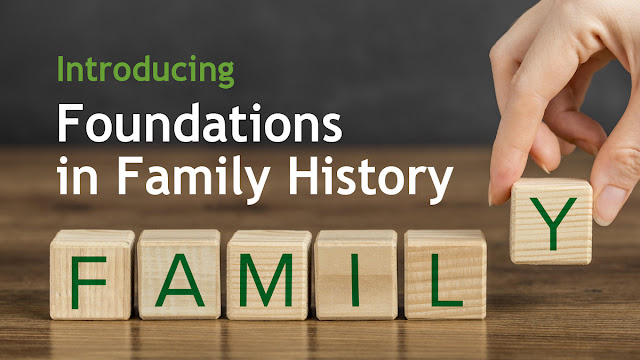The National Genealogical Society Welcomes
Margaret Fortier and Mary Roddy as its New NGSQ Editors
The National Genealogical Society (NGS) has named Margaret R. Fortier, CG®, and Mary Kircher Roddy, CG, as co-editors of its National Genealogical Society Quarterly (NGSQ). They take the reins of editorial responsibility for this prestigious publication from retiring editors Nancy A. Peters, CG, CGLSM, and Allen R. Peterson, AG, CG.
“I am honored to be chosen as co-editor along with Mary,” said Margaret Fortier, of Medford, Massachusetts. “We look forward to presenting the work of genealogical authors to expand the knowledge and skills of all genealogists.” Mary Kircher Roddy of Seattle, Washington added, “It is an honor for us to be selected and add our contributions to those of the many great NGSQ editors. We’re excited to work with authors to share their research with the genealogical community.”
“I am honored to be chosen as co-editor along with Mary,” said Margaret Fortier, of Medford, Massachusetts. “We look forward to presenting the work of genealogical authors to expand the knowledge and skills of all genealogists.” Mary Kircher Roddy of Seattle, Washington added, “It is an honor for us to be selected and add our contributions to those of the many great NGSQ editors. We’re excited to work with authors to share their research with the genealogical community.”
 |
| Mary Kircher Roddy, CG |
Roddy is a trustee of the Board for Certification of Genealogists and was treasurer of the Association of Professional Genealogists from 2018 through 2021. She has both published and peer reviewed several articles in the NGSQ since 2018. She is a frequent presenter at conferences and for societies in the US, Canada and Australia on methodology and record types. She is one of the founders of the Applied Genealogy Institute. Her personal research focuses primarily in Ireland, California, Pennsylvania, and Ohio but extends to genealogical records in Germany. In addition to the NGSQ, her articles have appeared in NGS Magazine, Family Chronicle, Internet Genealogy, and various society publications. She was a mentor for ProGen study groups.
 |
| Margaret Fortier, CG |
“We are pleased that NGS has selected two outstanding genealogists to succeed us as co-editors,” said Nancy Peters and Allen Peterson. “We are confident the Quarterly will be in good hands. Under their skilled editorial direction, the NGSQ will continue its long history of publishing leading-edge, quality case studies and family histories with enduring value to our field.”
A full-time professional genealogist, Peters served as a trustee of the Board for Certification of Genealogists (BCG) and was the editor of its newsletter, OnBoard. She conducts in-depth research to solve complex problems of identity and kinship for clients. Her personal and client research focuses primarily on the southeastern United States, New York, England, and Germany. Peters lectures at national and local conferences and instructs on skill-building topics and genealogy standards at BCG Education Fund workshops, the Salt Lake Institute of Genealogy, and other venues. Her articles have appeared in the NGSQ among other publications. She authored the “Research Reports” chapter in the Writing, Editing & Publishing section of Professional Genealogy: Preparation, Practice, & Standards.
Peterson has served as co-editor of the NGS Quarterly (NGSQ) since January 2019. He is a former BCG trustee and was vice-president of the International Society for British Genealogy and Family History. He has published and peer reviewed numerous articles in the NGSQ during the past decade. His research experience is primarily focused in England but extends to genealogical records in Kentucky, New Jersey, North Carolina, Pennsylvania, Utah, and Virginia. Peterson served as the director of the Katy Texas Family History Center—an annex of the Family History Library in Salt Lake City—for seventeen years and is a member of NGS, and several other genealogical societies in the United States and Britain. In addition to the NGSQ, his articles have appeared in NGS Magazine; the Jackson County (North Carolina) Genealogical Society’s Journeys Through Jackson; The Genealogical Magazine of New Jersey, and The Derbyshire Family History Society. He is the author of two, privately printed, family history books.
 |
| Nancy A. Peters, CG, CGL |
 |
| Allen R. Peterson, CG |
“We are fortunate to have recruited such excellent genealogists to take the helm of the Quarterly and build on the work of Nancy Peters and Allen Peterson,” said NGS President Kathryn Doyle. “We are so thankful to Nancy and Allen and appreciate their talent, hard work, and dedication in maintaining the high standards of the NGSQ. As co-editors since 2019, they have not only given voice to wonderful authors, but they ensured the ‘Q’ remains invaluable to everyone learning genealogy. They have further cemented the ‘Q’ as one of the foremost scholarly genealogical journals. We know that Margaret and Mary will continue that legacy.”
NGS also gratefully acknowledges the work of NGSQ Editor Search Committee members LaBrenda Garrett-Nelson JD, CG, CGL, FASG, Judy G. Russell, JD, CG, CGL, and David E. Rencher, AG, CG, FIGRS, FUGA.
The words Certified Genealogist and its acronym, CG, are a registered certification mark, and the designations Certified Genealogical Lecturer and its acronym, CGL, are service marks of the Board for Certification of Genealogists®, used under license by board certificants after periodic evaluation.















